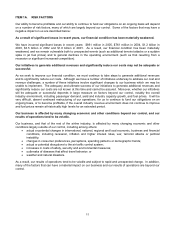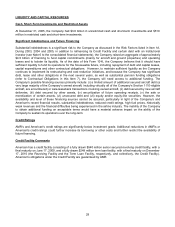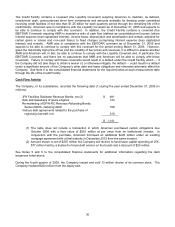American Airlines 2005 Annual Report Download - page 24
Download and view the complete annual report
Please find page 24 of the 2005 American Airlines annual report below. You can navigate through the pages in the report by either clicking on the pages listed below, or by using the keyword search tool below to find specific information within the annual report.
21
Miami-Dade County (the County) is currently investigating and remediating various environmental conditions at
the Miami International Airport (MIA) and funding the remediation costs through landing fees and various cost
recovery methods. American and AMR Eagle have been named as potentially responsible parties (PRPs) for the
contamination at MIA. During the second quarter of 2001, the County filed a lawsuit against 17 defendants,
including American, in an attempt to recover its past and future cleanup costs (Miami-Dade County, Florida v.
Advance Cargo Services, Inc., et al. in the Florida Circuit Court). The Company is vigorously defending the
lawsuit. In addition to the 17 defendants named in the lawsuit, 243 other agencies and companies were also
named as PRPs and contributors to the contamination. The case is currently stayed while the parties pursue an
alternative dispute resolution process. The County has proposed draft allocation models for remedial costs for the
Terminal and Tank Farm areas of MIA. While it is anticipated that American and AMR Eagle will be allocated
equitable shares of remedial costs, the Company does not expect the allocated amounts to have a material
adverse effect on the Company.
Four cases (each being a purported class action) have been filed against American arising from the disclosure of
passenger name records by a vendor of American. The cases are: Kimmell v. AMR, et al. (U. S. District Court,
Texas), Baldwin v. AMR, et al. (U. S. District Court, Texas), Rosenberg v. AMR, et al. (U. S. District Court, New
York) and Anapolsky v. AMR, et al. (U.S. District Court, New York). The Kimmell suit was filed in April 2004. The
Baldwin and Rosenberg cases were filed in May 2004. The Anapolsky suit was filed in September 2004. The
suits allege various causes of action, including but not limited to, violations of the Electronic Communications
Privacy Act, negligent misrepresentation, breach of contract and violation of alleged common law rights of privacy.
In each case plaintiffs seek statutory damages of $1000 per passenger, plus additional unspecified monetary
damages. The Court dismissed the cases but allowed leave to amend, and the plaintiffs in the Kimmell and
Rosenberg cases filed amended complaints on June 24, 2005. The Company is vigorously defending these suits
and believes the suits are without merit. However, a final adverse court decision awarding substantial money
damages would have a material adverse impact on the Company.
American is defending two lawsuits, filed as class actions but not certified as such, arising from allegedly improper
failure to refund certain governmental taxes and fees collected by the Company upon the sale of nonrefundable
tickets when such tickets are not used for travel. In Harrington v. Delta Air Lines, Inc., et al., (filed November 24,
2004 in the United States District Court for the District of Massachusetts), the plaintiffs seek unspecified actual
damages (trebled), declaratory judgment, injunctive relief, costs, and attorneys' fees. The suits assert various
causes of action, including breach of contract, conversion, and unjust enrichment against American and
numerous other airline defendants. Additionally, the same attorneys representing the Harrington plaintiffs have
filed a qui tam suit entitled Teitelbaum v. Alaska Airlines, et al. American was notified it is a defendant in this case
in December 2005. This case, also pending in the United States District Court for the District of Massachusetts,
asserts essentially the same claims (but also asserts that the United States has been damaged) and requests
essentially the same relief on behalf of the United States. The Company is vigorously defending the suits and
believes them to be without merit. However, a final adverse court decision requiring the Company to refund
collected taxes and/or fees could have a material adverse impact on the Company.
On March 11, 2004, a patent infringement lawsuit was filed against AMR, American, AMR Eagle Holding
Corporation, and American Eagle in the United States District Court for the Eastern District of Texas (IAP
Intermodal, L.L.C. v. AMR Corp., et al.). The case was consolidated with eight similar lawsuits filed against a
number of other unaffiliated airlines, including Continental, Northwest, British Airways, Air France, Pinnacle
Airlines, Korean Air and Singapore Airlines (as well as various regional affiliates of the foregoing). The plaintiff
alleges that the airline defendants infringe three patents, each of which relates to a system of scheduling vehicles
based on freight and passenger transportation requests received from remote computer terminals. The plaintiff is
seeking past and future royalties of over $30 billion dollars, injunctive relief, costs and attorneys' fees. On
September 7, 2005, the court issued a memorandum opinion that interpreted disputed terms in the patents. The
plaintiff dismissed its claims without prejudice to its right to appeal the September 7, 2005 opinion, and the plaintiff
is pursuing such an appeal. Although the Company believes that the plaintiff’s claims are without merit and is
vigorously defending the lawsuit, a final adverse court decision awarding substantial money damages or placing
material restrictions on existing scheduling practices would have a material adverse impact on the Company.
























